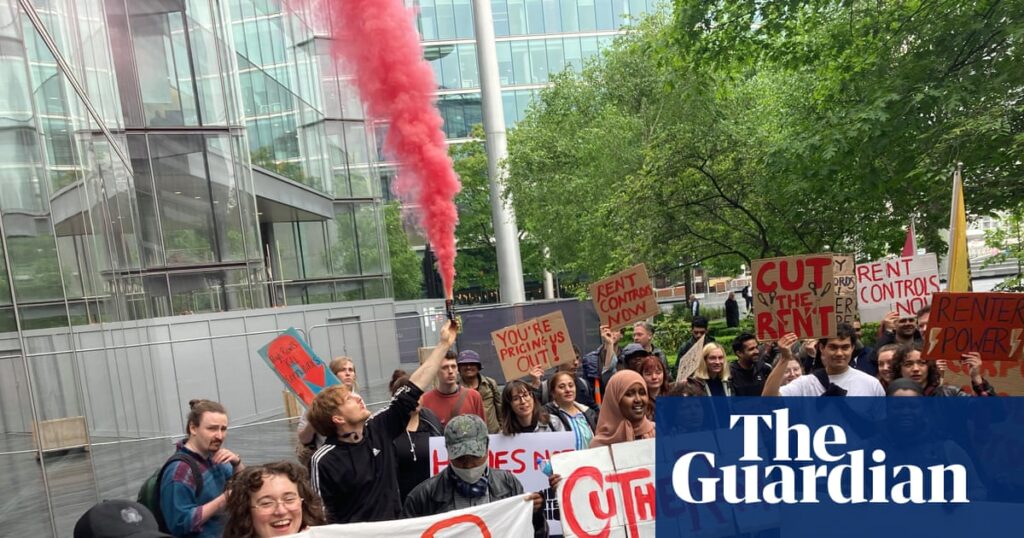Ministers who earn profits from privately owned property could be seen as hypocrites by voters who want to see the government’s promised rent reforms become law, campaigners have said.
The warning comes after Guardian analysis revealed four cabinet ministers – including the chancellor, Rachel Reeves – have declared rental income from property in the MPs’ register of interests.
The disclosure, which comes after the resignation of the homelessness minister Rushanara Ali over the eviction of tenants from her London property, has drawn strong criticism from campaigners and backbenchers.
One senior MP said the fact that frontbenchers made money from private property ownership undermined the government’s credibility when it comes to reforming the rental sector.
One said: “The perception that MPs are profiting from the same system we’re supposed to reform isn’t helping … there’s a real risk voters will see this as hypocrisy and question our credibility on renters’ rights.”
Alongside Reeves, the foreign secretary, David Lammy, and the Scotland secretary, Ian Murray, have declared rental income exceeding £10,000 in the most recent register of members’ interests.
Lucy Powell, the leader of the House of Commons, is also included but is understood to have a single lodger and receives less than £10,000 in rent.
Reeves’s disclosure relates to a London house jointly owned with her partner, meaning at least some of the rent is paid to another person. Hers is one of 31 properties listed by MPs where at least some portion of the rent was paid to another person.
The Guardian’s analysis found one in eight Westminster MPs – including 10 with government posts – declared a rental income from property in the last year.
This includes almost a quarter of the Conservative parliamentary party (27 MPs), just 11% of Labour MPs (43 MPs) and 10% of Liberal Democrats (7 MPs).
The two MPs with the largest declared property incomes are both from Labour. Jas Athwal, MP for Ilford South, rents out 15 residential and three commercial properties in London. Last year, he was criticised by Keir Starmer after he was accused of renting out flats with black mould and ant infestations.
Athwal was followed by the former chancellor Jeremy Hunt, who rents out seven flats in Southampton, and has half a share in a holiday home in Italy and an office building in London.
Most of the 169 properties rented out by MPs were residential, but some MPs also let out business and commercial premises. More than two in five (43%) of the properties rented out by MPs were in London.
The figures have intensified scrutiny of Ali’s case, which has cast new light on the debate over landlord interests in parliament. Ali resigned on Thursday night after it was revealed she had ended her tenants’ fixed-term contract in order to sell the property, but re-listed it for rent at a higher price within six months.
The practice is one the Labour government is seeking to ban under its flagship renters’ rights bill. The bill will end “no fault” evictions under section 21, which allows landlords to throw out tenants without reason.
Since the policy was first proposed in April 2019 under Theresa May, 123,889 section 21 claims have progressed to court, and 124,360 households in England have been threatened with homelessness as a result of being served a notice.
Originally, the legislation would have banned landlords who evict tenants in order to sell from re-letting the property for 12 months However, the House of Lords amended the bill to reduce this period to six months. The bill was one of several pieces of legislation that became delayed until after the parliamentary summer recess.
MPs must only declare a rental property on the register of interests if it, either by itself or as part of a portfolio, provides rental income of more than £10,000 in a calendar year – meaning more MPs could be landlords without declaring it. The Guardian analysis excluded agricultural land holdings.
The disclosure has drawn sharp criticism from housing campaigners. Jae Vail, a spokesperson for the London Renters Union, said: “The sheer number of landlords in parliament is shocking. During an unprecedented housing crisis, it’s a blatant conflict of interest that MPs are making millions from struggling renters – while some even use taxpayer money to cover their own personal rents. Tenants need a government that works for us, not one that profits from our hardship.”
Ben Twomey, the chief executive of Generation Rent, said MPs were “around three times more likely to be landlords than the rest of us”, adding: “Landlord power within parliament has left renters with few legal protections when it comes to arbitrary evictions or unreasonable rent hikes. The government must use this moment to double down on its manifesto promise to renters to fix our broken renting system.”
One senior figure on the left of the party went further: “We can’t claim to fight for renters while half the PLP are landlords collecting rent from people struggling through the housing crisis. Rushanara’s case is only the tip of the iceberg. Voters see the hypocrisy and it’s killing our credibility on housing.”
A spokesperson for Ministry of Housing, Communities & Local Government said: “There are already clear transparency rules around this.
“We’re focused on improving standards and security for tenants, and our renters’ rights bill will level the playing field between landlords and tenants. We’re determined to deliver this landmark legislation swiftly, so tenants can have greater security in their homes.”


